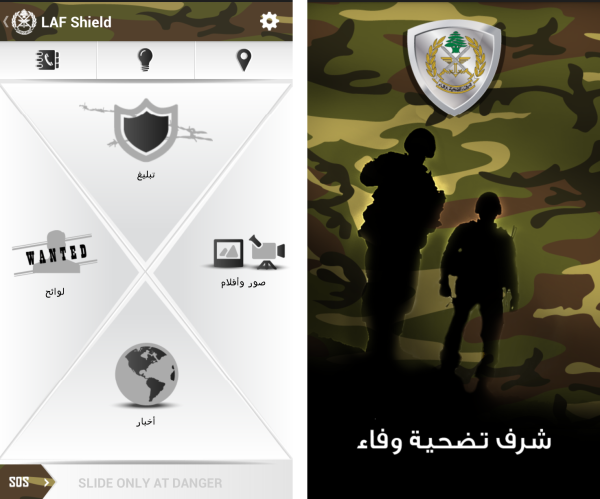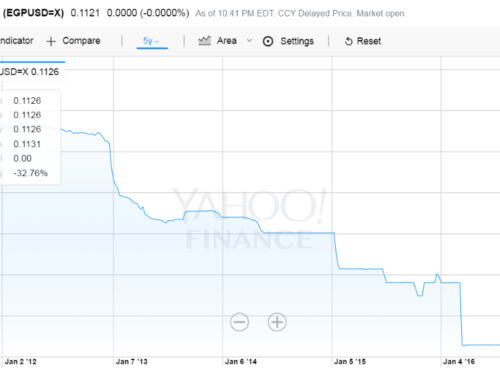Just in case you can’t get enough of the Lebanese army billboards on the main highways in Lebanon, you can now carry them in your pocket, too: the “Lebanese Army – LAF Shield” has finally landed in your Android and Apple app stores.
Developed by the same company that also brought you “Dating Worldwide” and “Yoshi KSA” (I can’t bring myself to describe the last one so I won’t — just click if you want to know more), the LAF Shield app was launched earlier this week, along with a press release from the army command that emphasized the army’s need for a “direct communications channel with the citizens.” The app aims to “involve the largest numbers of citizens in defending the country,” while also providing necessary assistance in emergencies.
Lebanese tech bloggers reacted to the release by quickly pointing out that the app requires several (standard) permissions requests, and more importantly requires users to enter a name and phone number to use the app. The application offers no privacy policy to the users regarding the data it collects. That means there’s a risk that the owner can resell your data to third parties (typically advertisers). The data could also be used to connect names to devices that can be geolocated.
Not living in Lebanon and not having to worry much about the Lebanese army collecting data from my phone, I downloaded it anyway. I had to enter my name (“The Dude”) and a phone number.
LAF Shield opens with the slogan of the army, “Honor, Sacrifice, Loyalty,” and then moves to a snappy screen divided into four sections, which are worth a brief review.
The first two, “News” and “Photos and Videos,” are quintessential army PR, with footage of soldiers training and photos of things blowing up. Hidden in a sub-menu of the “News” section is a rubric called “Statements,” which offers breaking news about violent clashes as well as current information about incursions and danger zones. Needless to say, this is one of the most useful services provided by the app, and as such it deserves to be much more readily accessible.
Then there’s a section titled “Report,” which was largely the focus of the army’s communiqué. This section provides you with options to file reports on thefts, accidents, and suspicious objects or vehicles; it even allows you to upload a photo or a video. Click on any option, and the app will automatically use your phone’s GPS to search for your location (I couldn’t find any possibility for turning this option off from within the app, save for disabling the phone’s GPS), and then offers a text box where you can write your report and send it.
The last section, “Lists” (which comes with a very “Wild West” logo that reads “WANTED” in English), remains under construction, but already includes a “Report” button similar to the one in the rubric mentioned above. Surely that will be of interest to a few bounty hunters out there….
Perhaps the simplest and most useful feature of the app is a list of emergency numbers. The distress signal — a bar at the bottom of the screen that reads “SLIDE ONLY IN CASE OF DANGER” — does nothing but launch your phone dialer to call the Ministry of Defense’s emergency number. This is probably where a geotagged predefined message would have actually been useful.
The Lebanese Army has been putting great emphasis on communication, both locally and globally. Its trilingual website offers content in Arabic, French, and English. The latter, clearly aimed at the international public, is updated reasonably frequently; at the time of writing, the English website was only 48 hours behind the French one, and just four days behind the Arabic. The site provides information about the army and its training, news updates, warnings, and press communiqués.
This new communication drive comes at a very difficult time geopolitically. The Syrian civil war isspilling over into Lebanon and Lebanese militias are getting involved on the ground in Syria, threatening further instability and relegating the Lebanese army to something of a bystander role. As one current Lebanese joke has it: “The Lebanese army is proud to be the third-strongest army… in Lebanon.” Putting a direct newsfeed from the army in everyone’s pocket is, in part, an effort to boost the army’s image and underline its relevance to the current situation.
But there’s a clear security purpose there as well. A police official reportedly told [link in Arabic] AFP that since the latest car bombing in Beirut on Aug. 15, the Lebanese police has received “over a thousand reports a day” from across the country about suspicious cars. So far, “all reports have been false,” he added. By encouraging people to file a coherent report with visual support, the army hopes it will be able to better differentiate the hysterical from the true., the app is likely to need several updates, but as it stands now it’s reasonably functional and well designed. But is it really for security or for churning out propaganda? That remains to be seen. Already today, the app started pushing the army’s daily press release to my home screen, so that’s one point for propaganda. But in the meantime, downloads of the app are quite high (over 20,000 in its first three days, according to the Army command [link in Arabic]), though there are no numbers on app-submitted reports.
It’s worth noting that Lebanon still suffers from quite expensive and underperforming wireless internet service which may undermine the entire effort. The jury is still out on whether users will turn to an app like this in times of distress, particularly given such constraints. In any event, let’s pray we never have to find out.
Originally published at Foreign Policy: Transitions.




